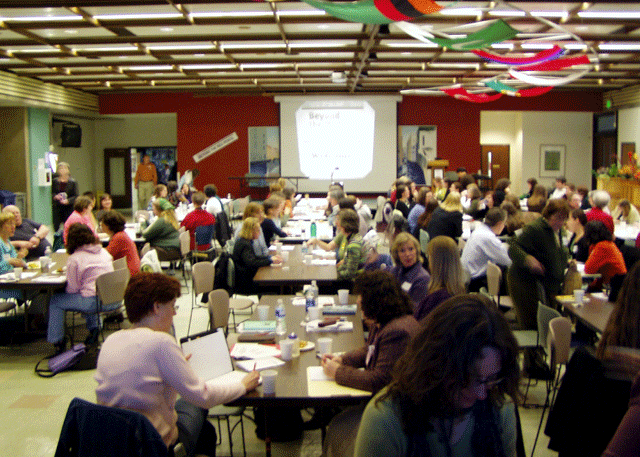
Say Hello to Your 2018 Northwest Editors Guild Board
Here’s a friendly introduction to the twelve-person all-volunteer board of directors who serve two-year terms and work on committees that support the Guild’s mission: connecting clients with professional editors, fostering community among our members, and providing resources for their career development.

What’s the Big Idea? Four Words that Can Define a Work in Progress
A couple of years ago, I got the urge to write a book. I’d recently returned from a sabbatical in Europe, where my husband, Eric, and I walked a thousand miles on the Camino de Santiago, a network of pilgrimage trails that date back to the Roman Empire. I hadn’t intended to write about the trip when I left, but when I got back I couldn’t shake the suspicion that there was something book-worthy in the experience.
I’d worked in book publishing for almost two decades by that point, including the past seven years as a developmental editor and collaborative writer. I’d seen hundreds of manuscripts, both fiction and nonfiction. And while there was a lot about becoming an author I didn’t know yet, I did know that the first step wasn’t just to start typing away at Chapter 1.

Q&A with Guild Mascot Giant Pencil
The Northwest Editors Guild’s oversized writing implement mascot, Giant Pencil, has been making appearances at events and on social media during the last year. In fact, starting July 23, Giant Pencil will be hosting the Editors of Earth Twitter account—a rotating curator account with a different editor hosting each week. It’s the first pencil to be asked to host.
As Giant Pencil’s following increases, we’ve received many questions about this well-dressed No. 2 of large proportions. We sat down with Giant Pencil to get to the point (pencil puns included).

What We Learned at ACES 2018
Approximately a dozen Editors Guild members convened in Chicago with more than 700 other editors during the ACES 2018 conference April 26–28. ACES: The Society for Editing (formerly known as the American Copy Editors Society), a national organization for professional editors, hosts its annual three-day conference in a different U.S. city each spring.
The ACES conference is often the venue where the major style guides and dictionaries announce upcoming changes in spelling, style, and usage. It is especially well known as the conference where each year the Associated Press announces updates to its Stylebook in a room full of gasping and cheering editors. (The 2016 lowercasing of the word “internet” brought a mix of applause and disgusted harrumphs, while this year’s comparatively tame removal of the hyphen in “3D” didn’t cause nearly as many emotional reactions.)


Programming Committee Roundtable
The powerhouse behind member meetings, workshops, coffee hours, and other special events, the board’s programming committee, consisting this year of Kelley Frodel, Kristin Carlsen, and Pm Weizenbaum, is vital to the smooth operation of the EdsGuild. Earlier this year, we got these busy ladies to sit down for a little while and talk to us about their responsibilities and what it’s like working for the board.

Marketing for Editors: Takeaways from a Guild Discussion
Effective marketing includes deciding where you want to focus your efforts (perhaps independent authors), as well as how (such as presenting at conferences). All the panelists felt a professional website is important. It should describe your editorial experience, the kinds of editing you specialize in, and how you work with clients—anything and everything to show that you are the person someone wants to work with.
Networking, which can strike fear in the hearts of introverted editors, entails meeting and connecting with others and communicating who you are and how you can fulfill their needs, whether it’s being published, attracting more clients, increasing sales, or improving writing skills.

Learning From Mistakes
Has this ever happened to you? You accept a new manuscript project for copyediting. You think you’ve correctly assessed the level of editing needed and bid accordingly. Indeed, the writer claims to have already paid for an editor, though she is a bit vague as to what she paid for.
You get to work, thinking you know how many days and hours it will take to finish the project. But wait—something is very wrong. That’s an odd expression for a novel set in medieval times. Ah well, must be a fluke. She did have another editor work on this manuscript, after all . . .

Meet Your New 2017 Edsguild Board
On January 7 the EdsGuild board had our annual retreat in West Seattle at a coworking space generously provided by Kerrie Schurr. Membership on the board changes every year, with some members stepping down after their two years of service and new volunteers stepping in, and many continuing members changing positions, and we’ve found over the last several years that a day-long retreat is a great way to get to know each other a little if we weren’t acquainted before, get onto the same page with logistics and regulations, and plan for the year ahead.
This year is an especially exciting one, coming up on the Guild’s 20th anniversary as well as our 6th conference in the fall, and we’ll be taking some time over the next month or so on this blog to introduce you all to our board members, the committees and positions they serve in, what those committees have planned in the coming year, and how you can get involved. For now, we’d like to give you a chance to get to know a little bit about your new board members.

Thinking Hard for Ourselves: A Short History of Editors
Chapter five of Susan Bell’s The Artful Edit, a book on the craft of self-editing*, is dedicated to the (mainly western and Eurocentric, it must be said) history of editing. She traces the editor’s genealogy through the following positions.
She originates editing with scribes, who, in ancient Mesopotamia, “had to downplay their reading skills lest they antagonize their employer” with their powers to understand and shape the written word. Later, in medieval Europe, “the sleepy scribe would accidentally skip or alter words; the arrogant yet lucid would rewrite an obtuse passage; the zealous would interpolate” (and sometimes a feline coworker would contribute their own take on a manuscript).
